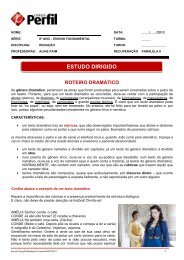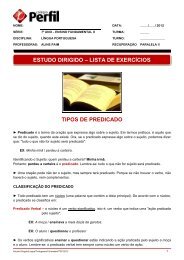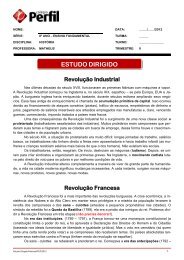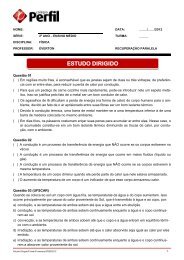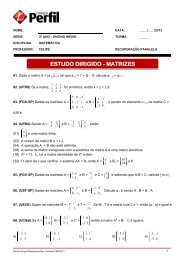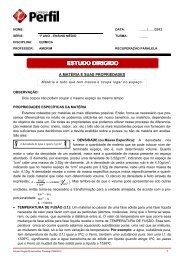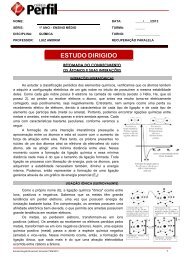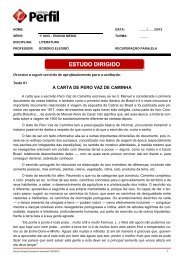Estudo-Dirigido-INGL..
Estudo-Dirigido-INGL..
Estudo-Dirigido-INGL..
You also want an ePaper? Increase the reach of your titles
YUMPU automatically turns print PDFs into web optimized ePapers that Google loves.
NOME: DATA: _____/____/2012<br />
SÉRIE: 1º ANO – ENSINO MÉDIO TURMA: ______<br />
DISCIPLINA: <strong>INGL</strong>ÊS<br />
PROFESSORA: SUEIDY PARAÍSO RECUPERAÇÃO PARALELA<br />
QUANTIFIERS<br />
SINGULAR PLURAL<br />
MUCH = A LOT OF, LOTS OF, A PLENTY OF<br />
(MUITO)<br />
ESTUDO DIRIGIDO<br />
MANY = A LOT OF, LOTS OF (MUITOS)<br />
LITTLE (POUCO) FEW (POUCOS)<br />
A LITTLE (UM POUCO) A FEW (ALGUNS)<br />
Uncountable nouns: substantivos usados sempre no singular.<br />
Exemplos: sugar, money, etc. (usados com much, little e a little)<br />
Countable nouns: substantivos usados no singular e no plural.<br />
Exemplos: book, girl, letter. (usados com many, few e a few.)<br />
01. In the following sentences, fill in the gaps with one of the following quantifiers: much, many, a lot of,<br />
a little, little, a few, few<br />
1. It seems to me that we haven't had assignments in English this term.<br />
2. How material can we be expected to read in one week?<br />
3. I've unfortunately had headaches already because of stress.<br />
4. Our yard looks awful this summer. There are too weeds.<br />
5. I didn't use fertilizer last spring, and that has made a difference.<br />
6. Also, I've paid very attention to how rain we've had.<br />
7. I'm afraid it's rained times this summer, and that is why the grass is turning brown and dying.<br />
Farmers are very upset.<br />
8. How good would it do if we watered the plants ourselves? .<br />
<strong>Estudo</strong> <strong>Dirigido</strong>/Inglês/II trimestre/1ºEM/2012 1
9. They said that just help could make a big difference.<br />
10. people know as much about computers as Tomas does.<br />
11. It does us good when the banking system collapses.<br />
02. Fill in the blanks with appropriate quantifiers: little / a little / few / a few.<br />
1. We must be quick. We have time.<br />
2. Listen carefully. I'm going to give you advice.<br />
3. Do you mind if I ask you questions?<br />
4. This town is not a very interesting place to visit, very tourists come here.<br />
5. I don't think Jill would be a good teacher. She's got patience.<br />
6. 'Would you like milk in your coffee?' 'Yes, please .’<br />
7. This is a very boring place to live. There's to do.<br />
8. 'Do you ever go to Atlantic City?' 'Yes, I go there times every year.'<br />
DE IGUALDADE<br />
DE INFERIORIDADE<br />
DE SUPERIORIDADE<br />
GRAUS DE ADJETIVOS<br />
COMPARATIVO<br />
AS + ADJETIVO + AS<br />
Animal species are as important as plant species.<br />
Em orações negativas o primeiro as pode ser substituído<br />
por so:<br />
NOT SO/NOT AS + ADJETIVO +AS<br />
An eagle is not so rare as a condor.<br />
LESS + ADJETIVO + THAN<br />
Some species are less adaptable than others.<br />
- Com adjetivos de 3 ou mais sílabas:<br />
MORE + ADJETIVO + THAN<br />
My brother is more responsible than my sister.<br />
- Com adjetivos monossilábicos:<br />
ADJETIVO + SUFIXO ER + THAN<br />
A lion is stronger than a wolf.<br />
<strong>Estudo</strong> <strong>Dirigido</strong>/Inglês/II trimestre/1ºEM/2012 2
- Com adjetivos de 3 ou mais sílabas:<br />
THE MOST + ADJETIVO<br />
This is the most efficient program of all.<br />
- Com adjetivos monossilábicos:<br />
THE + ADJETIVO + SUFIXO EST<br />
February is the shortest month of the year.<br />
SUPERLATIVO<br />
NOTAS<br />
1) Os adjetivos monossilábicos terminados em e e os dissilábicos terminados em ple e ble recebem r<br />
no comparativo e st no superlativo:<br />
large – larger – largest<br />
simple – simpler – simplest<br />
2) Nos adjetivos monossilábicos e dissilábicos terminados em y, precedido por consoante, substitui-se<br />
o y por i e acrescenta-se er / est:<br />
dry – drier – driest<br />
happy – happier – happiest<br />
3) Nos adjetivos terminados em consoante +vogal tônica + consoante, dobra-se a última letra e acrescenta-se<br />
er / est:<br />
big – bigger – biggest<br />
hot – hotter – hottest<br />
4) Nos adjetivos dissilábicos terminados em er, ly, ow e some, acrescenta-se er/est ou usa-se more /<br />
the most:<br />
Clever – cleverer (more clever) – cleverest (the most clever)<br />
Yellow – yellower (more yellow) – yellowest (the most yellow)<br />
5) Os demais adjetivos dissilábicos recebem more no comparativo e most no superlativo:<br />
famous – more famous – the most famous<br />
6) IRREGULARES<br />
GOOD – BETTER – BEST<br />
BAD – WORSE – WORST<br />
MUCH / MANY – MORE – MOST<br />
LITTLE – LESS* - LEAST<br />
FEW – FEWER ** - FEWEST<br />
*LESS (MENOS) : usado antes de uncountable nouns<br />
There is less interest in poetry today.<br />
**FEWER (MENOS) : usado antes de countable nouns<br />
The world has fewer animals and plants than in 1600.<br />
<strong>Estudo</strong> <strong>Dirigido</strong>/Inglês/II trimestre/1ºEM/2012 3
01. Marque a alternativa que completa corretamente as frases abaixo usando os quantitatives.<br />
I – She drinks ____________ coffee.<br />
II – How ______________ cups of coffee do you drink?<br />
III – There was ______________ milk in the pot. It was almost empty.<br />
IV – There are ______________ bottles on that shelf.<br />
V – How ______________ money do you have?<br />
a) little, many, little, few, many.<br />
b) many, much, little, few, many.<br />
c) much. few, little, few, many.<br />
d) much, many, little few, much.<br />
02. Marque a alternativa que completa corretamente a frase “Health is ___________ than wealth”.<br />
a) good. b) better. c) well. d) best.<br />
03. Complete a frase “Love is _____________ feeling for me” com o superlativo de superioridade do<br />
adjetivo complicated e depois marque a alternativa correta.<br />
a) more complicated than.<br />
b) the more complicated.<br />
c) the most complicated.<br />
d) the complicated.<br />
OUTROS EXERCÍCIOS<br />
01. Empregue corretamente os quantitativos many ou much e em seguida marque a alternativa com a<br />
sequência correta.<br />
_____________ things.<br />
_____________ people.<br />
_____________ advice.<br />
_____________ time.<br />
a) many – much – many – much.<br />
b) many – many – much – much.<br />
c) much – many – much – many.<br />
d) much – much – many – many.<br />
02. Complete as frases abaixo com little ou few e em seguida marque a alternativa com a sequência<br />
correta.<br />
There are ____________ chairs in the classroom.<br />
There was _____________ milk in the glass.<br />
I don’t like _____________ sugar in my coffee.<br />
There were _____________ trees in this Forest.<br />
a) few – few – little – little.<br />
b) little – few – few – little.<br />
c) few – little – little – few.<br />
d) little – little – few – few.<br />
03. Marque a alternativa cuja frase esteja correta, de acordo com o uso dos quantitatives.<br />
a) They need much water. c) I have few time.<br />
b) She has many money. d) We have little cookies.<br />
<strong>Estudo</strong> <strong>Dirigido</strong>/Inglês/II trimestre/1ºEM/2012 4
04. Marque a alternativa que completa corretamente as frases abaixo, usando os quantitatives.<br />
I – How __________ girls are there in the classroom?<br />
II – Fernando had ___________ food to eat.<br />
III – We need __________ information.<br />
IV – _____________ children were swimming in the pool.<br />
a) many – little – much – few.<br />
b) many – few – much – little.<br />
c) much – few – many – little.<br />
d) much – little – many – few.<br />
05. Marque a afirmação incorreta, de acordo com o uso dos quantitativos.<br />
a) Many é o oposto de few.<br />
b) Much é o oposto de little.<br />
c) Os quantitatives são sempre usados antes dos substantivos nas frases.<br />
d) A expressão a lot of pode substituir few e little.<br />
06. Complete a frase “Your accent is ____________ I have ever heard” com o superlativo de superioridade<br />
do adjetivo bad.<br />
a) worse than.<br />
b) the worst.<br />
c) the worse.<br />
d) worst than.<br />
07. Marque a alternativa que completa adequadamente a frase: “Brazil is the ___________ country in<br />
South America”.<br />
a) larger.<br />
b) more large.<br />
c) largest.<br />
d) most large.<br />
08. Complete a frase “The teacher is ____________ the doctor” com o comparativo de superioridade do<br />
adjetivo interesting.<br />
a) the interestingest.<br />
b) the most interesting.<br />
c) more interesting than.<br />
d) interestinger than.<br />
09. Marque a alternativa que completa adequadamente a frase: “Last week I was ______ this week”.<br />
a) busier than.<br />
b) busyer than.<br />
c) the busiest.<br />
d) the busyest.<br />
10. Marque a alternativa cuja frase esteja empregando incorretamente os graus dos adjetivos.<br />
a) Can Bob run as fast as Jack?<br />
b) A table is usually less heavy than a chair.<br />
c) Portuguese is the lest difficult subject I have.<br />
d) She was the most popular than girl in school.<br />
<strong>Estudo</strong> <strong>Dirigido</strong>/Inglês/II trimestre/1ºEM/2012 5




